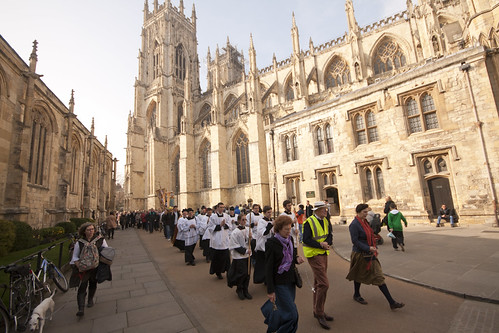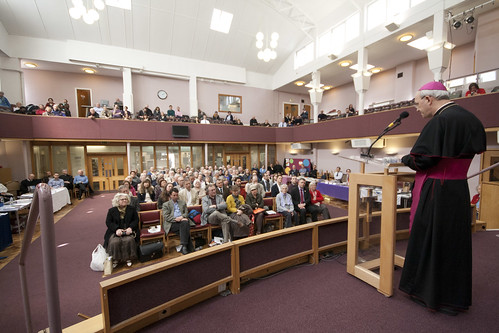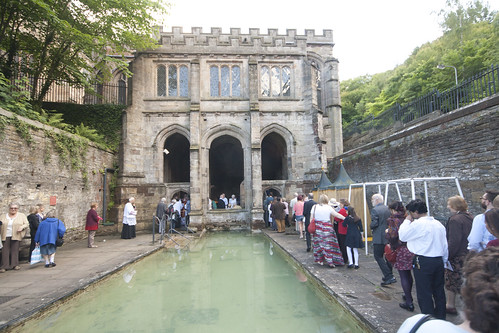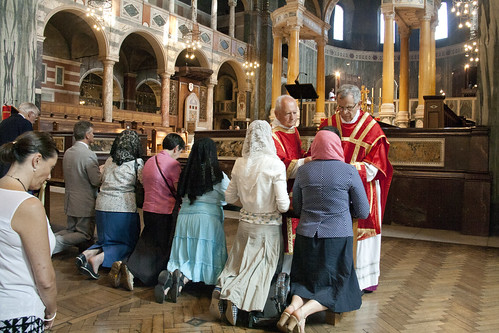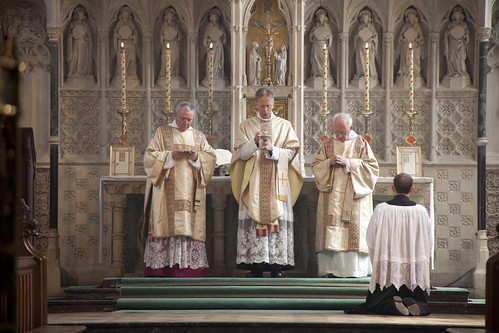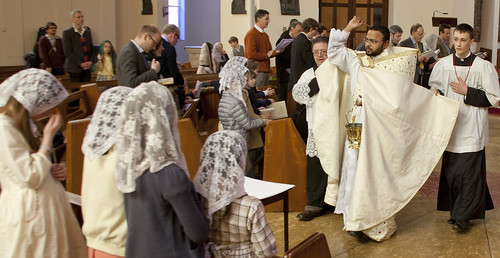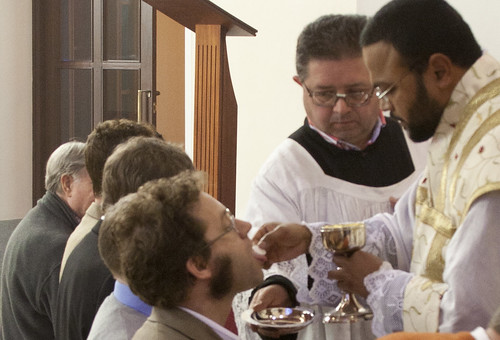Chairman's Blog
The problem of divorce in the first place
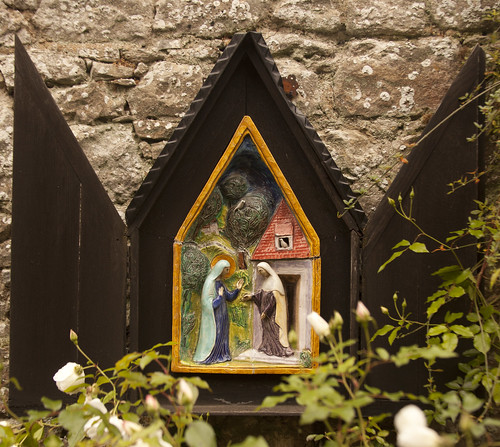 |
| The Visitation. From the Rosary Walk at Aylesford Priory. |
I, like many people, have been rather focused on the question of what happens after the divorce of a Catholic couple. There is a danger of allowing a very dubious liberal assumption to go unchallenged: that marital breakdown 'just happens', and when it happens it is by definition irreparable.
Catholics are not allowed to walk out on their spouses whenever they fancy. Knowing that this is the case puts one in a different frame of mind in dealing with marital problems. If this truth is not taught and understood, Catholic spouses, and their children, are exposed to the horrible problems of divorce as practiced in the secular world.
If you don't have a firm grip on the obligations of marriage, the obligation to maintain a common life - not walk out - the contribution of the teaching of the indissolubility of marriage is to make life more difficult, without any compensation. But that is exactly the situation we have. Marriage is indissoluble, we are told, but in practice the Church places no constraint on separation. In theory, the Church condemns separation except for a limited number of very grave causes; in theory, Catholics with marital difficulties should go to their bishop before seeking legal separation or divorce, to determine the justice of such a move. But no one wants to call unjust separation and divorce, and marital abandonment, what it is: a grave sin.
And things are getting worse. The recent reform of the annulment procedure has made defence against a declaration of nullify even harder than before.
This below is from 'Mary's Advocates', a campainigng group.
Imagine you are a child that doesn’t want your married parents to divorce. In the U.S.A., with no-fault divorce, millions of parents file for divorce against the other spouse, when the other spouse wants to keep the family intact and has done nothing severe enough to justify separation.
These children hope and pray that someone will help save them and their family from divorce. If the Catholic Church implemented her own canon law on separation and divorce, at least the Church would be trying to keep families together.
The children in these families don’t want to lose their home (which typically happens in divorce) because after lawyers are paid, and the property is split between two parents, there is not enough money to keep the family home. They’ll lose their every-day access to the parent that doesn’t want divorce. The children are saddened that they will never be able to bring their own future children to visit Grandma and Grandpa in the same home. Even though it makes children cringe, if one parent has a new sex-partner, the children will be ordered to spend overnight visits with the parent that has the new sex partner. Or, the children will have to live with the parent and the new sex partner.
In the no-fault divorce culture, nobody is standing for marriage and Mary’s Advocates, the non-profit organization, is working to change that. Letters were recently mailed to approximately one third of the dioceses in the U.S. asking the Church to teach what the Catechism and canon law actually teaches about divorce.
If an unhappy Catholic spouse insisted on forcing divorce on his or her family, even after being instructed by the Church that there is no legitimate reason for separation, at least the children would know that Jesus’ Church spoke in support of their need and desire for an intact family.
Tragically, there are professed Catholics who file for divorce and think they have done nothing wrong, because some priest had affirmed their choice, numbing their conscience. If we lived in a different era, the outcome of civil divorce proceedings might have been in accord with divine law. However, spouses are now filing for divorce when the other has done nothing grave enough to justify separation. Wanting a breakup in these circumstances is in fact "malicious abandonment" in the Catholic tradition.
Why Marry in the Church At All
People ask, "Why would anyone care about getting married in the Church anyway?" because the Church doesn't appear to care. The publicized pastoral care seems to be as follows:
1. Prior to a marriage, a priest reviews with a couple the doctrine of the permanence of marriage and the requirement of sexual fidelity; the spouses agree to work out any future marriage difficulties.
2. Years later, when one party wants out, a second priest will affirm the spouse wanting the breakup who now says, "I think I was immature when I married; I've fallen out of love, and I'm unhappy and tired."
3. A third priest, who works at the tribunal office will instruct the party who wants the breakup that he or she is required to get a civil divorce first. The civil lawyers take lots and lots of money; the children and property are split in whatever random fashion is customary in the area.
4. Finally, a fourth priest acts as a Procurator/Advocate and writes an annulment petition. In the dioceses that cover half the population of the United States, tribunals decided the marriage was invalid for 98.7% of the petitioners in 2012.*
Rather than following this pattern, Mary's Advocates proposes an alternative. Before divorce, the Church could conduct an investigation and instruct the spouse wanting the breakup whether there is a legitimate basis to file for civil divorce (i.e. simply follow canon law). Furthermore, only the ecclesiastic authority has jurisdiction to determine the parameters of a separation plan which is in accord with divine law (cf. canon 1692).
(*note. Saint Pope John Paul II and Pope Benedict XVI have criticized the misuse of canon law to grant annulments for alleged immaturity.)
See letter to bishops. http://www.marysadvocates.org/eventsnews/160402_ImploreBishops.html
Pointing bishops to webpage about canon law on separation. http://www.marysadvocates.org/terms/terms.html Bai Macfarlane Mary’s Advocates DONATE http://www.marysadvocates.org ma.defending@marysadvocates.org 330-690-8942 "Pray daily for the Roman Rota and for all who work in the sector of the administration of justice in the Church, with recourse to the motherly intercession of Mary Most Holy, Speculum iustitiae." Pope Benedict XVI's Address Jan. 26 2008 Reply Forward Support the work of the LMS by becoming an 'Anniversary Supporter'.
New study on the Lectionary: old and new
 Mathew Hazell's Index Lectionem is a comprehensive comparison of the old and new Lectionaries. It is not exactly bedtime reading - it is a huge table. But the contents are fascinating. Buy it here.
Mathew Hazell's Index Lectionem is a comprehensive comparison of the old and new Lectionaries. It is not exactly bedtime reading - it is a huge table. But the contents are fascinating. Buy it here.
Peter Kwasniewski notes in the Introduction:
John 19:25–27: 'Now there stood by the cross of Jesus, his mother, and his mother’s sister, Mary of Cleophas, and Mary Magdalen. When Jesus therefore had seen his mother and the disciple standing whom he loved, he saith to his mother: Woman, behold thy son. After that, he saith to the disciple: Behold thy mother. And from that hour, the disciple took her to his own.'
In the older form of the Mass, this Gospel is read each year for the Seven Sorrows of the BVM (September 15), the Commemoration of the Seven Sorrows of the BVM (Friday after Passion Sunday), the Immaculate Heart of the BVM (August 22), the Common of Our Lady on Saturdays (fourth formulary), and feasts celebrated in particular places, e.g., Our Lady, Mediatrix of All Graces (May 8). A Catholic frequenting the usus antiquior would hear this Gospel several times a year. At an Ordinary Form Mass, he is likely, at best, to hear these verses only once, in passing, on Good Friday, since all other uses of it are optional and buried among numerous options
| What the table looks like. This page illustrates how the texts, here from Daniel, chosen by each lectionary differ. |
No doubt for different reasons, the following two verses, 1 Corinthians 10:7-9, part of the Traditional Lectionary for the 9th Sunday After Pentecost, are totally excluded from the 1970 Lectionary.
Neither become ye idolaters, as some of them, as it is written: The people sat down to eat and drink, and rose up to play. Neither let us commit fornication, as some of them committed fornication, and there fell in one day three and twenty thousand. Neither let us tempt Christ: as some of them tempted, and perished by the serpents.
So is this passage, of a quite different character, across Romans 12:17–21, used in the old Lectionary as part of the Epistle of the 3rd Sunday After the Epiphany:
To no man rendering evil for evil. Providing good things, not only in the sight of God, but also in the sight of all men. If it be possible, as much as is in you, have peace with all men. Revenge not yourselves, my dearly beloved; but give place unto wrath, for it is written: Revenge is mine, I will repay, saith the Lord. But if thy enemy be hungry, give him to eat; if he thirst, give him to drink. For, doing this, thou shalt heap coals of fire upon his head. Be not overcome by evil, but overcome evil by good.
| The Gospel of John. To a remarkable extent, what is in the old Lectionary is not in the new: and vice versa. |
Dr Kwasniewski gives more examples, and the book sets out the whole thing in detail. None of this would be surprising if the reform of the Lectionary did not have as its chief publicly stated purpose (and the only purpose given it by the Second Vatican Council), that of providing a larger selection of scriptural texts. It is indeed a larger set of texts, but they still went to amazing trouble to exclude texts they didn't like, for a variety of reasons, from use. Some are buried among scores of options given for votive Masses unlikely ever to be considered, let alone used; others are completely absent.
As Bugnini noted in his book Reform of the Liturgy, Pope Paul didn't even look at the lectionary in detail. He was too busy, so he just approved it. It represents an extraordinary and surely unprecedented imposition on the Church of the whims of a group of experts. Far from being, as is frequently asserted, an undisputable success of the Reform, the Lectionary is a real problem: and one which is only beginning to be studied.
This book will be an indispensible aid to that study.
See the Position Paper on the Lectionary here.
Support the work of the LMS by becoming an 'Anniversary Supporter'.
Skojec and Burke on the significance of Amoris Laetitia
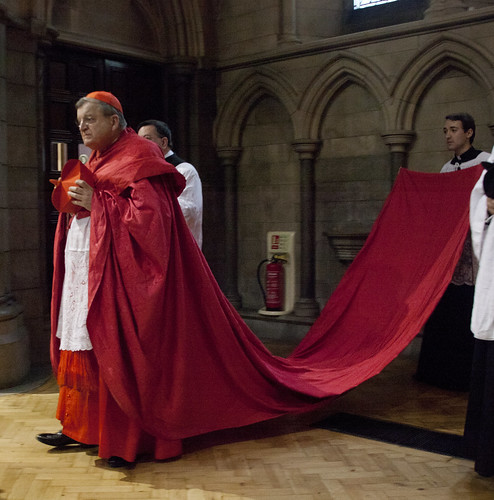 |
| Ecce sacerdos magnus: Cardinal Burke enters St James', Spanish Place, to confer the sacrament of Confirmation last November, in a service organised by the Latin Mass Society. |
It is hardly surprising that the Exhortation Amoris laetitia has provoked a range of responses, but I was struck by the unhappiness expressed by Steve Skojec on One Peter Five about the response of Cardinal Burke - Skojec expressed great disapointment that it was not more strongly-worded. Skojec would perhaps have the same thing to say about the response of the British Confraternity of Catholic Clergy, of the canonist Edward Peters, and of my own response. These, as a group, certainly contrast with Skojec's response, the responses of Antonio Socci and of Prof de Mattei published on Rorate Caeli, the response of Voice of the Family, and many others from a Traditional Catholic or conservative perspective, as they do with the response of avowed liberals. Readers can populate the categories with further examples for themselves.
The liberals are telling us that the Communion for the divorced and remarried is now allowed.
The group I will call Skojec's, for want of a better label, is telling us that the Exhortation is a 'disaster' because the liberal reading is a natural one.
What Cardinal Burke and his group are saying is that, if you look carefully at the document, and in particular at the key passages the liberals appeal to, it turns out that it makes no attempt to establish new teaching, or even make formal changes to discipline, for example by changing Canon Law.
As I have just characterised them, the Skojec reading and the Burke reading are not necessarily in conflict. It can be true that, from a logical, theological, and canonical point of view, the Exhortation doesn't make any difference, but also true that it is going to be hard to argue against the liberal contention that it makes a big difference in practice. This is in fact frequently the case with Church documents.
Here is a relevant question, however. My longstanding concern has been with the situation of priests under pressure to give Holy Communion to public sinners, something they cannot in conscience do: a group well represented by the Confraternity of Catholic Clergy. They haven't been skewered, in this Exhortation, in quite the way widely predicted, but liberals are celebrating as if they have been: as if they have been ordered by the Pope to act against their consciences and the tradition of the Church. The question is: is it more helpful to priests in this situation to agree with the liberals that, 'practically speaking', or 'on a natural reading', they have been ordered to do this?
No, it is not helpful, and not for reasons of presentation or politics, but because these priests' subjective moral situation is not changed by any such 'practically speaking', 'natural reading' of the document. On many matters, though not this one, it would be changed by a properly formulated papal command, or a change in Canon Law, but that is not what we have here.
What Skojec is, perhaps, saying, is that we have a situation like King Henry II shouting out, in 1170, 'Who will rid me of this turbulent priest?' Henry wanted his knights to kill St Thomas Becket, but did not want to order them to do so. He wanted to be able to deny doing so; he knew that, even if he'd attempted to put his command into formal language, it would have been legally invalid, since he did not have the legal or moral authority order extrajudical killings. The knights weren't exactly wrong in their interpretation of the King's words; where they were woefully mistaken was in imagining that these words gave them any kind of warrant, legal or moral, to carry out the King's wishes.
In this situation it does not become irrelevant that the King failed to issue a proper decree, or that he did not have the authority to issue such a decree anyway. No: it becomes a matter of supreme importance. What we need to emphasise is that the King's outburst makes no legal or moral difference. This seems to be something Skojec and others have missed.
Supposing the King had issued a decree. Suppose the Pope had changed Canon Law. Then I would have felt the obligation to point out - as I already have hypothetically - that whatever Canon Law said, priests remain bound by Divine and Natural Law on this subject. It may be that Cardinal Burke, the Confraternity of Catholic Clergy, and others in this group, would have felt the same. I wonder if that was what Cardinal Sarah had in mind when he said that there were things that the Church in Africa would not accept. Perhaps that's what Cardinal Pell was thinking of when, according to reports, he warned the Holy Father that certain options would lead to schism. At any rate, a lot of people would have felt obliged to go into battle in a whole new way if that had happened. Well, we have avoided that, thanks be to God. Perhaps it was never going to happen; perhaps we were a hair's breadth away from it happening: I don't know. The significance of it not happening is completely lost on the liberals, who have long ago given up on the concepts of Divine and Natural Law, and neither understand nor care about Canon Law. But it is of fundamental importance.
Cardinal Burke and those who think like him don't necessarily have to disagree in substance with what Skojec and others are saying about the tone of the Exhortation, the dangers it contains, the way it is likely to be applied and so on. Skojec and his ilk ought to see, however, that what Burke is doing is necessary and supremely valuable. He is placing the Exhortation, and whatever negative outcomes it may, in practice, cause, into the correct category: not as a schism-causing event, not as a case of a Pope teaching heresy, but as a non-magisterial, non-legislative document which points out, when you get down to line-by-line analysis, that people are often in very complicated situations and should be treated with charity.
There is a very important difference between the position taken up by Cardinal Burke, and those like him, and an extreme Ultramontanist position, the position which says the Pope is always right. One difference is hypothetical: what would have happened if the Exhortation had been different. But there is another very important difference. Cardinal Burke lays great stress on interpreting Church documents in light of the whole tradition of the Church. This is of huge importantance, and it is something the Ultramontanists fail to do. This is frequently going to lead Catholics with a lively sense of tradition to read documents in a different way from others. It doesn't mean that we blind ourselves to the practical implications, the perspectic of the secular media, and so on. What it means is that we don't, like Ultramontanists, feel we have change our entire world-view every time there is a new Pope with a new set of priorities or way of expressing himself. And nor do we have to become sede vacantists.
To reiterate what I've said a few times, Traditional Catholics, or at least those of us trying to engage with the hierarchy, magisterial documents, and the currently 'officially approved' theology, have become very used to this situation. A liberal says to us: the Church now allows Communion in the Hand, and the natural way of reading this is about us being adults, whereas in the past we were treated as children: ergo, the traditional practice is theologically defective. We say: if that were true, it would be a breach with the constant teaching and practice of the Church. Let's look at the relevant documents: well, what do you know, Paul VI explicitly denied the liberal interpretation ('The [traditional] custom does not detract in any way from the personal dignity of those who approach this great sacrament'). The liberal may protest that no-one takes any notice of that, but it is there. But then again, even if Pope Paul had gone mad and condemned the old practice as actually defective, then the weight of the tradition would be enough to show that it was legitimate.
We can go on to infer, from the very fact that we are having this conversation with the liberals, that there is a problem with Communion in the Hand, since it is causing confusion and cutting people off from the wisdom of the Church's tradition. What we can't do is to see the official permission for the new practice as condemning the old one. The new practice may be a mistake, but it is not a case of Rome falling into heresy.
This is not dishonest, and it is not cowardly. We are deeply interested in setting out our case in way which is comprehensible to mainstream Catholic theologians and people in the Roman Curia, and appeals to things they recognise have weight, but we are under no illusions that our views will make us popular. Our approach is, in fact, about looking at facts squarely in the face. These facts include the way the document is going to be understood by liberals and by the media. They also include the precise theological and canonical assertions a document is and is not making, and the light shed on the issues by the Church's whole teaching and tradition. Ignoring any of these facts cripples one's ability to deal rationally and appropriately with the situation.
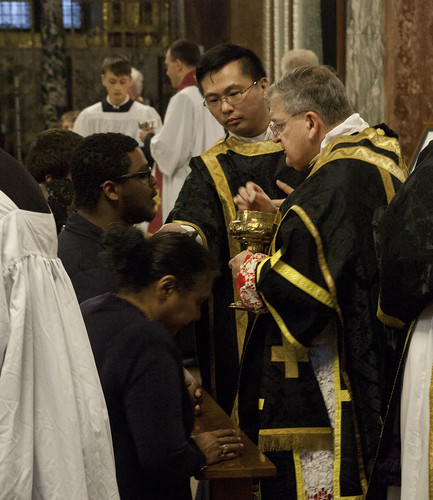 |
| Cardinal Burke distributing Holy Communion at the Latin Mass Society's annual Requiem in Westminster Cathedral. |
Support the work of the LMS by becoming an 'Anniversary Supporter'.
Some Spring and Summer events
Details are being confirmed for a number of Latin Mass Society events, so here is a little reminder. Click on the links for more information. Click on the photos for more photos - from previous years.
30 April 2016 (Saturday) LMS Pilgrimage to York
In honour of St Margaret Clitherow, one the LMS' two patron saints. Mass in the York Oratory, and a procession past her house to her place of execution, and back for Benediction.
14 May 2016 (Saturday) LMS One-Day Conference on the Family
With Fr Serafino Lanzetta, John Smeaton, Edmund Adamus, Prior Cassian Folsom of Norcia, and Joseph Shaw, an opportunity to reflect on the Family and the Church in light of Amoris laetitia. Tickets can be purchased on the day, but booking in advance encouraged, and essential if you want to get lunch in the venue.
3 July 2016 (Sunday) LMS Pilgrimage to Holywell
The only shrine in either England or Wales not to have been destroyed at the Reformation, we have Mass in the church of St Winifried and then process to her well to venerate her relic. Mass will be celebrated by the recently ordained Canon Scott Tanner ICKSP.
9 July 2016 (Saturday) LMS Annual General Meeting and High Mass
The Latin Mass Society's Annual General Meeting will be addressed by Archbishop Gullickson, Nuncio to Switzerland, until recently Nuncio to the Ukraine. Mass at 2pm is in Westminster Cathedral.
16 July (Saturday) LMS Day of Recollection, St Edmund's College, Ware
To be led by Mgr Gordon Read, it takes place in St Edmund's College, Ware, the only undisturbed Pugin chapel in the country. Mass, Benediction and Vespers accompanied by professional singers from Cantus Magnus and the Schola Gregoriana. Booking required.
Support the work of the LMS by becoming an 'Anniversary Supporter'.
Amoris laetitia: a preliminary conclusion
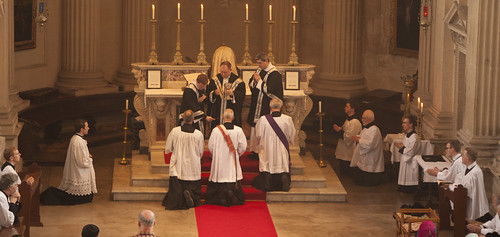 |
| High Mass of Requiem at the LMS Priest Training Conference, Prior Park. |
I've done a series of posts about the Exhortation now, focusing on particular passages. I must confess that it has not conformed to my expectations, and I suspect those of many, if not most, people. I had been expecting a more explicit addressing of the pastoral issues which have been so discussed in the last two years or so, with some practical guidance for priests, for example, about offering Holy Communion to couples in illicit unions. Instead, it has offered us a lot of discussion at a slightly more abstract level, and explicitly refused to make new rules, instead drawing our attention to a number of relevant factors, without telling us how to weigh those factors against each other.
It was predictable that different people would point to different passages and claim victory for different views. However, Pope Francis has deprived liberals (and depressed conservatives) of any passages (at least, which I have as yet got into focus) which say simply and clearly even that pastoral practice should change in a particular direction. The other thing he had not done is what we had at the end of the last Synod, which was a condemnation of the excesses of both sides of the debate.
As far as these more abstract discussions go, among a lot of other things, some very helpful, we have passages which take seriously some of the arguments made by Cardinal Kasper about the difficult situation some people find themselves in.
Thus, Kasper argued (so far as I could tell) that grave sins, done in full knowledge of their gravity, could be compatible with the life of grace, and therefore with reception of Holy Communion, because of the psychological difficulty of avoiding them, and of the need to maintain a home for the children of an adulterous relationship. The Exhortation mentions all the elements of this view, but it doesn't, quite, draw Kasper's conclusion.
Thus we hear that, just because a couple is in an illicit union on some definition or other, doesn't mean that they are in a state of mortal sin. There may be complicating factors. True: for example, there may be a failure of moral knowledge, or the couple may be living as 'brother and sister', or they may just have gone to Confession and be working things out. The subsequent discussion, however, does not appeal to any of these possibilities. Instead, it draws attention to other kinds of complication, which, while interesting and important, won't stop acts of adultery being mortally sinful, such as a concern for the health of the relationship in light of the children, force of habit, and other psychological impediments to a conversion of life. Then again, the Exhortation doesn't draw the conclusion that the second kind of complicating factors are such that the sins committed are not mortal. It leaves that up to the judgment of pastors...
It is open to people to say: this is teaching by hint, or 'dog-whistle'. But it also raises the question: if the Pope really wanted everyone to conclude that, for example, an adulterous couple with a strong habit of vice and a child whose home is underpinned by the sinful relationship, can receive sacramental absolution without a firm purpose of ending their acts of adultery, why did he not just say so? If the Pope did want to say that, and drew back from saying it, I suppose his reason must have been a concern not to cause things like scandal, schism, and an open break with the teaching of the recent Papal Magisterium, not to mention Scripture and the Fathers. On this presupposition, it is a deliberate decision, and the way we understand the teaching must respect the fact that the decision was made as it was. The Pope could have told adulterers to go to Communion with a light heart; he did not do so.
Catholics attached to the liturgical traditions of the Church, Catholics who seek to live in organic continuity with their predecessors in terms of belief, practice, liturgy and spirituality, are very familiar with this way of proceeding. I could list a dozen examples of Popes and other organs of the Church issuing documents which seemed, if not actually motivated by a rejection of traditional teaching, then are at least motivated by a desire not to be in conflict with those who reject it, to a greater or lesser extent. I have listed a number of examples here. In these documents, however, the rejection of the traditional teaching is never made quite explicit. On the contrary, lip service is made to the old teaching, sometimes very emphatically, while its practical implications are quietly swept away.
The practical implications of the Church's teaching about adultery include refusing Communion to adulterers, if the adultery is public. It may be that, with the subtle encouragement of the arguments of this Exhortation, that will be swept away, at least, even more than it already has been. There is a great difference, however, between this process and one in which priests are explicitly told that public sinners should be admitted to Communion.
Why? Because priests who doen't respond to the hints, if that is what they are, will not be in such a disastrously weak position they would have been in, had the Pope made an explicit change to Canon Law and the Catechism. I am thinking of their vulnerability not only to discipline within the Church, but against the secular law: I discussed the problem here.
Furthermore, in this case, as with a myriad of other cases over the last half century, we are not in a situation of a Pope explicitly teaching heresy. We can say whatever we like about how he should have been clearer, should have reiterated this or that teaching: perhaps he should. But he is not publicly and explicitly teaching heresy. This is important; it makes a big difference. Popes can teach heresy, they are not protected from doing that except under very specific conditions, and it has happened more than once in the history of the Church. It didn't happen yesterday, for all that the Exhortation was unclear or confusing. Even if we say it was malicious, even if we suppose that the Pope is a heretic in his heart, the document that we have before us does not contain propositions incompatible with the teaching of the Church - at least, that's my view, for what it is worth.
What we have now is not the final melt-down of the Church. We have, perhaps, a negative step, but if so it is one of many. We may perhaps say that the teaching of the Church is not as clear as it was, but this obscuring of the teaching has been a long, slow process. More serious, I think, by far, than Amoris laetitia, was the deliberate removal of dozens and dozens of references to sin, God's anger, damnation, repentance, penance, and grace, from the prayers of the liturgy, which happened with the promulgation of the 1970 Missal. That was a disaster for the Church, and the consequences continue to make themselves felt. It wasn't the proclamation of heresy: no, and that makes the whole sorry business harder to combat, in some ways. But in another way it means that there is something we can each and every one of us do, to reinforce the threatened truth: and that is, to pray the ancient liturgy, and to promote it.
See also my post on Pope Francis on the Mandatum and liturgical developments under his predecessors.
Support the work of the LMS by becoming an 'Anniversary Supporter'.
Amoris laetitia footnote 329: on the moral necessity of adultery
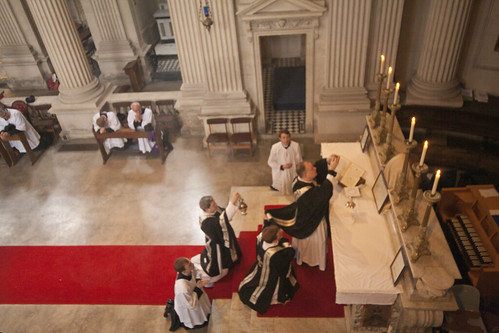 |
| Gestures pointing towards the reality of Christ's presence in the Blessed Sacrament. At LMS priest training conference, Prior Park. |
Section 298, with footnote 329, warrants comment. Here is the text.
The divorced who have entered a new union, for example, can find themselves in a variety of situations, which should not be pigeonholed or fit into overly rigid classifications leaving no room for a suitable personal and pastoral discernment. One thing is a second union consolidated over time, with new children, proven fidelity, generous self giving, Christian commitment, a consciousness of its irregularity and of the great difficulty of going back without feeling in conscience that one would fall into new sins. The Church acknowledges situations “where, for serious reasons, such as the children’s upbringing, a man and woman cannot satisfy the obligation to separate”.
Note (329): JOHN PAUL II, Apostolic Exhortation Familiaris Consortio(22 November 1981), 84: AAS 74 (1982), 186. In such situations, many people, knowing and accepting the possibility of living “as brothers and sisters” which the Church offers them, point out that if certain expressions of intimacy are lacking, “it often happens that faithfulness is endangered and the good of the children suffers” (SECOND VATICAN ECUMENICAL COUNCIL, Pastoral Constitution on the Church in the Modern World Gaudium et Spes, 51)
First, let's see what is being referred to.
Familiaris consortio 84 includes this passage:
Pastors must know that, for the sake of truth, they are obliged to exercise careful discernment of situations. There is in fact a difference between those who have sincerely tried to save their first marriage and have been unjustly abandoned, and those who through their own grave fault have destroyed a canonically valid marriage. Finally, there are those who have entered into a second union for the sake of the children's upbringing, and who are sometimes subjectively certain in conscience that their previous and irreparably destroyed marriage had never been valid.
Yup, the language was there back in 1982 under Pope St John Paul II. It goes on:
However, the Church reaffirms her practice, which is based upon Sacred Scripture, of not admitting to Eucharistic Communion divorced persons who have remarried. They are unable to be admitted thereto from the fact that their state and condition of life objectively contradict that union of love between Christ and the Church which is signified and effected by the Eucharist. Besides this, there is another special pastoral reason: if these people were admitted to the Eucharist, the faithful would be led into error and confusion regarding the Church's teaching about the indissolubility of marriage.
Reconciliation in the sacrament of Penance which would open the way to the Eucharist, can only be granted to those who, repenting of having broken the sign of the Covenant and of fidelity to Christ, are sincerely ready to undertake a way of life that is no longer in contradiction to the indissolubility of marriage. This means, in practice, that when, for serious reasons, such as for example the children's upbringing, a man and a woman cannot satisfy the obligation to separate, they "take on themselves the duty to live in complete continence, that is, by abstinence from the acts proper to married couples."
So curiously, while making appeal to the precedent of the language of Familiais consortio in the first paragraph I've quoted, Amoris laetitia appears to want to qualify the message of the other two quoted paragraphs, from the same section.
What does Gaudium et spes 51 say, in context? I've emboldened the phrases quoted by Amoris laetitia (which is using a different English translation and is quoting selectively).
This council realizes that certain modern conditions often keep couples from arranging their married lives harmoniously, and that they find themselves in circumstances where at least temporarily the size of their families should not be increased. As a result, the faithful exercise of love and the full intimacy of their lives is hard to maintain. But where the intimacy of married life is broken off, its faithfulness can sometimes be imperiled and its quality of fruitfulness ruined, for then the upbringing of the children and the courage to accept new ones are both endangered.
To these problems there are those who presume to offer dishonorable solutions indeed; they do not recoil even from the taking of life. But the Church issues the reminder that a true contradiction cannot exist between the divine laws pertaining to the transmission of life and those pertaining to authentic conjugal love.
This is a very interesting passage of Gaudium et spes. The Council Fathers are pointing to a problem with the practice of periodic sexual abstinence in marriage, to limit family size, which we would do well to bear in mind. Sexual union, open to life, of a married couple, serves to unite them as a couple. To exclude this from a marriage carries dangers: it can lead to temptations to infidelity, and to a breakdown of a proper attitude of openness to life. The teaching here is that 'Natural Family Planning' should be used sparingly. The passage goes on the condemn clearly the use of 'dishonourable' alternatives to NFP, which promise the continuation of sexual intimacy, stripped of its openness to life.
Amoris laetitia proposes a parallel with the situation of a couple engaged in an adulterous relationship. There certainly is a parallel. Not only can sex serve to give a degree of unity to a couple outside of marriage, this is one way the immoral nature of sex outside marriage manifests itself. Infidelity undermines the marriages of adulterers. Fornication creates an emotional and even spiritual bond without the protection of the committment of marriage. Sexual relationships outside marriage can become very intense: the bond can be very strong. It frequently happens, outside marriage, in a relationship initiated on the basis of sexual attraction, that the sexual bond is the only thing holding the couple together. The couple may find they have little else in common, and when the fires of passion subside, the relationship collapses. Such collapse can even happen when sex is only temporarily unavailable because of absense, illness, or after childbirth. We all know this: such relationships are flimsy, and that is exactly why they are unjust to the children.
Does it follow that people engaged in sex outside marriage should keep on commiting mortal sins in order to preserve their immoral relationships? Obviously not. But what if their immoral relationships have elements of fidelity and genuine charity? What if the stability of the immoral relationship is needed for the upbringing of the children of the relationship?
These are the questions reported by Amoris laetitia. Read the key sentence, in the footnote, again.
In such situations, many people, knowing and accepting the possibility of living “as brothers and sisters” which the Church offers them, point out that if certain expressions of intimacy are lacking, “it often happens that faithfulness is endangered and the good of the children suffers”
Note again, as I pointed out in previous posts, the possibility of moral ignorance is explicitly ruled out: Amoris laetitia has no interest in suggesting that the sins of a couple in an illicit union are not mortal because of ignorance of the rules. This was a common strategy among liberal priests in relation to contraception in the 1970s. No, we have moved on from that option. Rather, the question is raised: will it not do harm, to follow the rules? It asks the question; it does not provide the answer.
As a matter of fact the answer is provided by the two documents referred to in the footnote. Gaudium et spes rejects the 'dishonourable' means of limiting family size precisely whilst acknowledging the harm which can come to a marriage by denial of sex. Familiaris consortio demands a denial of illicit sex precisely whilst acknowledging the value of maintaining a common home for the children of the adultery.
The way the passage and the footnote present the question, and fail to articulate an answer, does not appear to be pointing towards the responses made by those two documents. It is rather easy, in fact, to read it as pointing in the opposite direction. The question posed by 'many people' points towards a dilemma in which there is no non-sinful option. I have already quoted and discussed the claim made slightly later in the document, in section 301:
A subject may know full well the rule, yet have great difficulty in understanding “its inherent values”, or be in a concrete situation which does not allow him or her to act differently and decide otherwise without further sin.
Looking at the two sentences together, the dilemma seems to be not exactly between two or more sinful options ('press the button and one man will die; do nothing and two men will die': academic ethicists love that kind of question), but between a sinful action and the risk of a greater sin later on. In Brideshead Revisited, Julia presents such a dilemma to her confessor: she can sleep with her fiancé Rex, or he will predictably fornicate with other women, which would be morally worse. In Evelyn Waugh's great phrase, 'the gentle old Jesuit would not give way.' No, no, absolutely not.
It is never justified to sin in order to avoid another sin. An example considered by St Augustine was suicide to avoid illicit sex. Augustine comments: in choosing to sin, we 'choose sin over innocence'. This is how morality works, in the Catholic tradition and, for that matter, in common sense. We aren't free to do whatever it takes to minimise the number of sins likely to be committed: lying to stop others lying more and worse, or murdering to stop more and worse murders. No, we are bound ourselves to avoid certain actions, and that limits the morally possible options we have. It would be convenient, or might seem so, if, as we seek the common good, we can take some short cuts and assassinate a few people, steal a few things, break a few laws, but no, we must go the long way round, and advance the common good by morally licit means.
This applies to our personal lives, as well as to public projects and politics. If your adulterous relationship isn't sustainable without sex, that is no justification at all for continuing the sex. If your children's education requires you to embezzle money from your employer, that is no justification at all for embezzlement. If your personal safety as a mafia thug requires you to beat up a series of people your bosses tell you to beat up, that is no justification at all for you to beat them up. We can sympathise with people in these situations, but they need to do the right thing. They need to free themselves from the apparant dilemma by accepting that they may not be able to prevent some bad things happening. There is, in truth, no real dilemma, no question of doing one wrong thing or else another wrong thing. There are options which are ruled out, morally, and there are options which are open to us. Of the latter, we must make the best of a situation which may be difficult, or disastrous. We can't try to solve our practical problems by committing injustices against others.
It may be this passage, and others like it, which make Cardinal Kasper think his position had been vindicated, since he has been advancing arguments about moral dilemmas, which I discussed here. As I have noted, however, the implications in this passage are not made explicit. I need to say more about the significance of a document which appears to encourage error, without explicitly doing so, but I have already pointed out that a pattern of pointing away from the teaching of the Church, when traditional practice and earlier documents point towards it, is a well-established one in the Church since the Second Vatican Council.
Support the work of the LMS by becoming an 'Anniversary Supporter'.
Amoris laetitia: that footnote 351
A passage making the same kind of point as the one I discussed in my last post is embellished with a footnote which has raised eyebrows - and was flagged up in the press conference. It is part of section 305.
Because of forms of conditioning and mitigating factors, it is possible that in an objective situation of sin – which may not be subjectively culpable, or fully such – a person can be living in God’s grace, can love and can also grow in the life of grace and charity, while receiving the Church’s help to this end.
Note (351): In certain cases, this can include the help of the sacraments. Hence, “I want to remind priests that the confessional must not be a torture chamber, but rather an encounter with the Lord’s mercy” (Apostolic Exhortation Evangelii Gaudium [24 November 2013], 44: AAS 105 [2013], 1038). I would also point out that the Eucharist “is not a prize for the perfect, but a powerful medicine and nourishment for the weak” (ibid. , 47: 1039).
While this might be as clear as one might like, I don't see what the fuss is about here.
On the main text, it is perfectly true that one can commit an act which is objectively sinful, without incurring the guilt of a subjective sin, if one is non-culpably ignorant that the act is sinful. This may be the result of ignorance about the nature of the act, as well as about the application of the moral law to the case at issue. 'Conditioning', in the sense of one's moral and practical education, may be involved in such mistakes.
It should be mentioned that ignorance of the most general principles of the Natural Law is not, in fact, possible, since is it written on our hearts (Romans 1:19f). Aquinas explains, accordingly, that moral ignorance is possible only of specific applications. Suprisingly, he then gives the example of ancient Germans apparantly not knowing that theft was wrong, which suggests that pretty basic parts of the Natural Law could still be at issue. Nevertheless, none of this is any use to liberals, as section 301 (discussed in my last post) makes clear, because the cases they want to focus on don't involve moral ignorance, however widely or narrowly construed. On the contrary, they want to talk about lifelong, practicing Catholics, well-informed about the Faith, constantly on the phone to the bishop and writing to the Catholic papers, 'churchy' people, or, as they say in Austria, 'candle cormorants' ('kurzlschlucker'). People who pay the Church tax. And naturally, if ignorance were an issue, it could be dispelled by a little teaching.
In light of this, the footnote, which anyway only repeats what Evangelii gaudium already said, is a statement of the obvious. The phrase 'the confessional must not be a torture chamber, but rather an encounter with the Lord’s mercy', reminds me of the splendid Fr Magdala Maria F.SS.R. at our recent Family Retreat, who after telling about the danger of eternal damnation in classic Redemptorist fashion, reminded us that his spitirual father and model, St Alphonsus, was 'a lion in the pulpit and a lamb in the confessional'. No one should be too afraid to go in the box.
And what of the Blessed Sacrament? Is it 'not a prize for the perfect, but a powerful medicine and nourishment for the weak'? Yes, this is perfectly true. Not for those in mortal sin - no, they are not weak, they are dead. They need to be brought back to life by sacramental absolution, in Confession. But when you crawl out of the Confessional, alive but weak, you should go to Holy Communion, and do so frequently.
Perhaps Pope Francis meant something else? I can only comment on the text we have. It went through a complicated process of editing and refinement, no doubt. Efforts were made, as they always have been made with important documents, to avoid statements which are wrong. At any rate in this passage, those efforts were successful.
Support the work of the LMS by becoming an 'Anniversary Supporter'.
Amoris laetitia: Is it possible to keep the Natural Law?
One very puzzling thing that Amoris laetitia says is this, from Section 301.
... it is can no longer simply be said that all those in any “irregular” situation are living in a state of mortal sin and are deprived of sanctifying grace. More is involved here than mere ignorance of the rule. A subject may know full well the rule, yet have great difficulty in understanding “its inherent values”, or be in a concrete situation which does not allow him or her to act differently and decide otherwise without further sin. As the Synod Fathers put it, “factors may exist which limit the ability to make a decision”.
There is then a reference to Aquinas' Summa Theologica (and the De Malo), and to the Catechism on mitigating circumstances.
A natural reading of this, which would also seem needed by the argument which follows about what we can expect of people in regard to straightening out their lives, would be simply this: sometimes it is actually impossible to follow the objective dictates of Natural Law, and for that reason people can't be blamed for not following them: and that in this we are talking about people in a state of grace. There is also the suggestion that people may be in a dilemma (or 'perplexity') in which there is no non-sinful option.
We need to keep in mind the teaching of the Council of Trent, Chapter XI.
But no one, how much soever justified, ought to think himself exempt from the observance of the commandments; no one ought to make use of that rash saying, one prohibited by the Fathers under an anathema,-that the observance of the commandments of God is impossible for one that is justified. For God commands not impossibilities, but, by commanding, both admonishes thee to do what thou are able, and to pray for what thou art not able (to do), and aids thee that thou mayest be able; whose commandments are not heavy; whose yoke is sweet and whose burthen light. For, whoso are the sons of God, love Christ; but they who love him, keep his commandments, as Himself testifies; which, assuredly, with the divine help, they can do.
This is infallible teaching, as expressed in the following Canon:
CANON XVIII.-If any one saith, that the commandments of God are, even for one that is justified and constituted in grace, impossible to keep; let him be anathema.
The reference to Aquinas made in the footnote to this passage is not helpful. Summa Theologica IaIIae Q65 a.3 ad 2 is about impediments to the exercise of certain virtues, but far from being impediments which excuse the agent in failing to fulfill a duty, these are impediments which don't stop the agent from acting on the virtue. It is a reference to Aristotle's theory that the excercise of a habit (good, bad, or mechanical) gives pleasure unless the exercise is 'impeded'; Aquinas is simply pointing out that impediments are more likely when the virtue has not been acquired by a process of training and habituation over time, but by an infusion of grace from God. This abstruse issue is completely irrelevant to the matter at hand, and makes me wonder about the intellectual integrity of the people advising Pope Francis at this point in the document.
Reference to the Catechism's considerations about mitigating factors such as duress, inadvertance, habit and so forth is also potentially misleading. Mitigating factors are mitigating: they don't change a bad action into a good one, but reduce the degree of guilt we bear for an objectively wrong action. Does this include making an action which could be a mortal sin into a non-mortal sin? Well, in mortal sin the agent must be conscious of the gravity of the act, and various factors can indeed obscure this for an agent. The odd thing about this paragraph, however, is that it does not want to focus on factors which affect the agent's knowledge of an action's gravity: 'More is involved here than mere ignorance of the rule.' What are we supposed to make of that? It is precisely ignorance of the rule, or the way it applies in a particular case, which is key in claiming that an objectively gravely wrong action is not a mortal sin, and that therefore the agent has not necessarily lost the state of grace.
It is hard to avoid the impression that this paragraph is trying to create a casuistic space for the idea that someone who is living a life of - for example - institutionalised adultery, in an illict marriage, who is perfectly aware of the teaching of the Church and equally aware that he and his supposed spouse are not free to marry each other, could be in a state of grace, and therefore could appropriately and fruitfully receive Holy Communion.
But that view is false. If you know that what you are doing is gravely sinful, and keep on doing it, you have committed a mortal sin and are not in a state of grace. Habits, duress, the needs of the children of the supposed marriage and all sorts of things can make it psychologically difficult to undergo the necessary conversion of heart: certainly. But God's mercy is available even for such sinners. Not the false mercy of leaving in their sin, but the mercy of granting them the grace of repentance and forgiveness.
Compare the parents of a family whose prosperity is founded upon some kind of grave injustice: a mafia family, say, whose money comes from extortion, kidnapping, and other crimes. All kinds of habits and duress will make repentance difficult. The obligation to support one's children creates a dilemma, also, for the parents, whose livlihood depends on grave sins. But none of this means that repentance is impossible, and while it would be a sin to plunge one's family into danger and poverty by intention or by negligance, it is not a sin to cause this result as a side-effect of leaving a gravely sinful lifestyle. In this case the subsequent danger and poverty are attributable, in fact, to earlier sins of the parents catching up with them. In other cases, even this may not be true: Blessed Franz Jägerstätter, an Austrian Catholic who refused to fight for the Nazis in 1943, left his young family in a vulnerable state when he went to his heroic death, but that was not wrong, because he was doing his duty.
Amoris laetitia does not make any definitive rules for or any changes to Canon Law; nor does it explictly contradict or re-write the Catechism, Pope St John Paul II's Familiaris consortio, or any other document which states the teaching of the Church: that public sinners should be refused Communion, and that those in a state of mortal sin cannot receive Communion fruifully. Instead it invites, more forcefully and authoritatively than before, that we should all treat individual cases on their merits. And so we should. It would be unfortunate if we did so on the basis of confusion about what mortal sin is.
Support the work of the LMS by becoming an 'Anniversary Supporter'.
Pope Francis on Fatherhood and authority
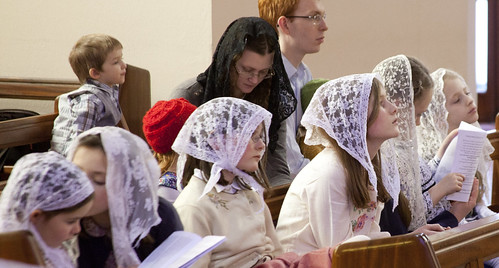 |
| Children in Mass at the recent Family Retreat, |
Since the Post-Synodal Exhortation Amoris laetitia is not the bombshell many were assuming, confining itself, on the 'hot button' issues, to what appears to be a restatment of the status quo (priests have to assess matters case by case, Holy Communion is not a reward for perfection etc. etc.), here is something which other news sources may neglect, but which was mentioned briefly in the Press Conference: the Holy Father has a surprising amount to say about Fathers. Surprising only because it is a subject, as I have lamented on this blog, which has been somewhat neglected in the Church. So here is a long quotation, sections 175-177. (Mothers are discussed in the immediately preceding sections. I don't include the footnotes, which refer to the sources of the internal quotations: mostly speeches of Pope Francis himself.) The full text is here (h-t Edward Pentin).
A mother who watches over her child with tenderness and compassion helps him or her to grow in confidence and to experience that the world is a good and welcoming place. This helps the child to grow in self-esteem and, in turn, to develop a capacity for intimacy and empathy. A father, for his part, helps the child to perceive the limits of life, to be open to the challenges of the wider world, and to see the need for hard work and strenuous effort. A father possessed of a clear and serene masculine identity who demonstrates affection and concern for his wife is just as necessary as a caring mother. There can be a certain flexibility of roles and responsibilities, depending on the concrete cirumstances of each particular family. But the clear and well-defined presence of both figures, female and male, creates the environment best suited to the growth of the child.
We often hear that ours is “a society without fathers”. In Western culture, the father figure is said to be symbolically absent, missing or vanished. Manhood itself seems to be called into question. The result has been an understandable confusion. “At first, this was perceived as a liberation: liberation from the father as master, from the father as the representative of a law imposed from without, from the father as the arbiter of his children’s happiness and an obstacle to the emancipation and autonomy of young people. In some homes authoritarianism once reigned and, at times, even oppression”. Yet, “as often happens, one goes from one extreme to the other. In our day, the problem no longer seems to be the overbearing presence of the father so much as his absence, his not being there. Fathers are often so caught up in themselves and their work, and at times in their own self-fulfilment, that they neglect their families. They leave the little ones and the young to themselves”. The presence of the father, and hence his authority, is also impacted by the amount of time given over to the communications and entertainment media. Nowadays authority is often considered suspect and adults treated with impertinence. They themselves become uncertain and so fail to offer sure and solid guidance to their children.
A reversal of the roles of parents and children is unhealthy, since it hinders the proper process of development that children need to experience, and it denies them the love and guidance needed to mature.
God sets the father in the family so that by the gifts of his masculinity he can be “close to his wife and share everything, joy and sorrow, hope and hardship. And to be close to his children as they grow – when they play and when they work, when they are carefree and when they are distressed, when they are talkative and when they are silent, when they are daring and when they are afraid, when they stray and when they get back on the right path. To be a father who is always present. When I say ‘present’, I do not mean ‘controlling’. Fathers who are too controlling overshadow their children, they don’t let them develop”. Some fathers feel they are useless or unnecessary, but the fact is that “children need to find a father waiting for them when they return home with their prob-lems. They may try hard not to admit it, not to show it, but they need it”. It is not good for children to lack a father and to grow up before they are ready,
Support the work of the LMS by becoming an 'Anniversary Supporter'.
New Catholic School in Bedfordshire
Support the work of the LMS by becoming an 'Anniversary Supporter'.

